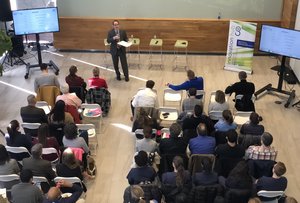The opioid crisis has been dominating headlines every day here in the United States. This crisis has shown no boundaries when it comes to age, race, ethnicity, or socioeconomic groups. It has made its way into households, hospital emergency rooms, courthouses, as well as schools and universities across the country, not only directly affecting hundreds of thousands of people, but their families, loved ones, and communities as well.
“This crisis kills more individuals every year than car accidents or guns,” stated Dr. Scott Weiner, director of The Brigham Comprehensive Opioid Response and Education Program during the iHub Speaker Series and HealthCheck Collaboration event “Solving the Crisis with Opioid and Pain Innovations” hosted on April 2 at the Brigham. “To date the death toll is greater than the peak of the AIDS epidemic and has killed more people than the Vietnam war.”
Recently, local community and government officials have been looking to health care professionals to help address this crisis at the front lines, as well as look into how we can prevent this occurring in the future. These experts have been working tirelessly to create more effective tools, processes, and overall initiatives hoping to aid those who are currently suffering, and prevent those coming into the hospital from becoming addicted to opioids in the future.
In Massachusetts alone, the state has averaged 2,000 deaths per year, but has recently seen a slight decrease. “However, there is still so much more to do. We need to think about how we can use innovations, technology and this new spirit we have– because we are all in a unique position where we have the ability and the duty to address this,” urged Weiner.
At the April 2nd event, the Brigham Digital Innovation Hub and MassChallenge HealthTech brought together experts from across the Brigham and the Boston community to create an open environment to discuss the current state of the opioid crisis and share their insights, current innovations and initiatives, and how they believe innovation and technology can help us move forward to a brighter future.
The event kicked off with a powerful keynote from Jack Kelly, author of Sharp Needle, and a diverse and dynamic panel featuring Hannah Maniates of Mayor Martin J Walsh’s Office of Recovery Services, Satya Prateek Bommaraju of Marigold Health, Dr. Christin Price of Brigham Health Bridge Clinic, and Dr. Joji Suzuki, an expert in addiction psychiatry at the Brigham. The panel was moderated by Felice Freyer of the Boston Globe.

